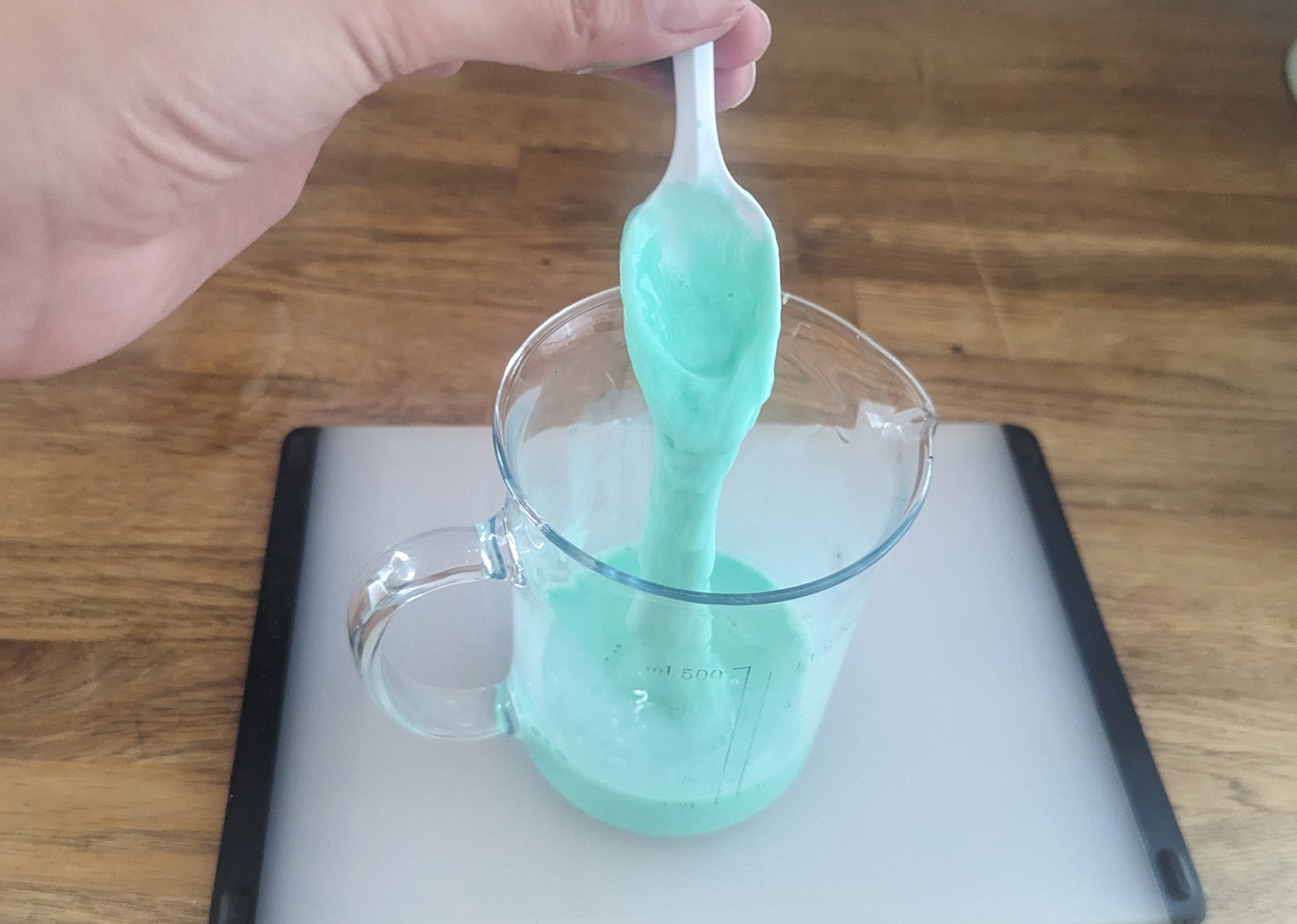We may earn revenue from the products available on this page and participate in affiliate programs. Learn more ›
Whether it’s a science project for your kids or a tool to clean your keyboard, you should learn how to make slime. It’s quick, fun, and easy, no matter what you use the sticky substance for.
For this basic slime recipe, you’ll only need ingredients you probably already have at home, and the result will be a mesmerizing goo that can be relaxing, useful, or both.
Stats
Time: 3 minutes
Cost: about $1 per cup
Difficulty: easy
Ingredients
1/2 a cup (4 ounces) of white liquid glue
1 cup of warm water
1/2 a teaspoon of borax
(Optional) food coloring
Measuring cup
Clean bowl
Spoon (or whisk)
Clean surface
How to make slime
 The result of this very brief project will be gucky green slime. Sandra Gutierrez for Popular Science
The result of this very brief project will be gucky green slime. Sandra Gutierrez for Popular Science
1. Mix the glue and half the water. Pour a half-cup of water into a measuring cup and add the glue. Stir until it’s completely mixed.
Pro tip: If you want to make a bigger or smaller batch, you can adjust the quantities of the glue and water you use in this step as long as you keep a 1:1 ratio between the two.
2. (Optional) Add food coloring. If you’re using food coloring, how much you use will depend on how bright you want your slime to be. If you want a color that truly pops, you’ll need to add at least five drops of food coloring. You can combine as many hues as you want, but make sure to stir thoroughly after every drop so you don’t end up with a brownish or greyish goo—unless that’s what you’re going for. As a reference, we used three drops of food coloring to achieve the minty green slime pictured above.
Once you’re happy with the color, stir again to make sure the mix is homogeneous.
[Related: How to make your own bath bombs]
3. Make your borax solution. Add the borax to the remaining half-cup of water and stir until the white powder is fully dissolved. This will happen more easily in warm water, but cold water will do just fine—it’ll just require some extra stirring.
Pro tip: A good way to ensure the borax is fully dissolved is to stir and wait a couple of seconds. If you still see borax crystals gathering at the bottom of your container, keep stirring.
4. Gradually add the borax solution to the glue mix while you stir. Do this in multiple small pours, or one spoonful at a time. You’ll notice the texture of the glue will immediately change and become sticky and slime-like, and you should only add more of the borax solution if there’s still any glue mix left. You might not need to use all of it. You’re done when the glue becomes one big blob.
 The glue and water mix will instantly react to the borax solution. Give it a good stir to fully combine them. Sandra Gutierrez for Popular Science
The glue and water mix will instantly react to the borax solution. Give it a good stir to fully combine them. Sandra Gutierrez for Popular Science
Note: The proportions in this recipe should get you to the right texture, but if some of the glue mix still hasn’t turned into slime after you’ve combined everything, you can make more borax solution.
5. Drop your slime on a clean surface, knead, and enjoy. Your newly born slime will require some kneading before it reaches a uniform texture. At first, the goo might stick to your hands, but it should retain its integrity after you play with it for a couple of seconds.
6. (Optional) Make your slime last longer. Slime has a limited life span depending on the temperature and humidity, and it’ll become brittle and less elastic in hot, dry weather. If you want to prolong the life of your slime, you can store it in a cool place inside an airtight container or zip-top bag. Spraying some water on it before you store it will also help prevent it from drying out.
Eventually, though, your slime will lose its elasticity or become extremely gross from all the gunk and grime it’s picked up. When that day comes, throw it in the trash—never flush it down the toilet—and replace it by making more slime.
The science behind slime
Slime is a non-newtonian fluid, which means it flows differently when under stress. This is why slime takes the shape of whatever container it’s in (like water), but you can still knead it into a blob (unlike water).
[Related: Turn ordinary chocolate into a glimmering, iridescent treat]
This particular viscosity happens when sodium tetraborate (the chemical name for borax) interacts with polyvinyl acetate (PVA), a synthetic polymer present in white liquid glue. At a molecular level, polymers are long noodle-like chains. But add borax and the chemical reaction will link these polymer strands, creating a strong 3D mesh that changes the viscosity of the glue-water mixture and turns it into slime.

>>> Read full article>>>
Copyright for syndicated content belongs to the linked Source : Popular Science – https://www.popsci.com/diy/how-to-make-slime/










